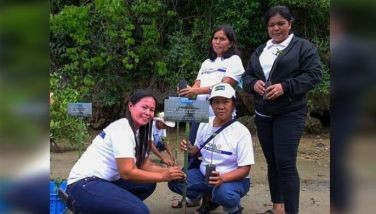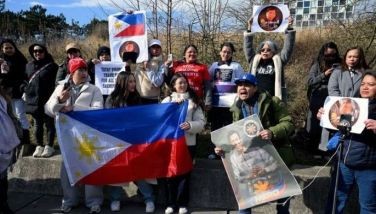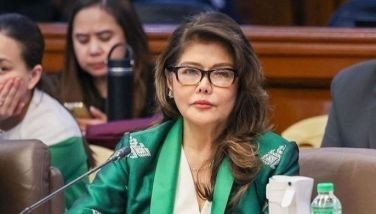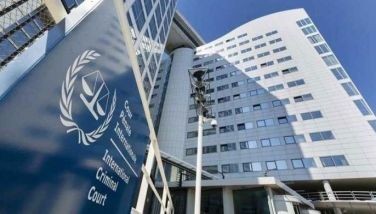A daily struggle to report the truth
May 2, 2002 | 12:00am
Victim or villain? Witness or weapon?
The journalist’s daily struggle to report the truth in the face of terrorism, satisfying the public’s need for information without being used at the same time by the state or terror groups, was described in vivid detail by top journalists during the opening yesterday of the three-day international conference on "Terrorism and Media" sponsored by the United Nations Educational, Scientific and Cultural Organization (UNESCO) at the Westin Philippine Plaza.
Risks to journalists have increased since the terror attacks on the US last Sept. 11, with 59 journalists and other media workers killed in 2001, experts told participants.
The emerging consensus on the first day of the three-day conference was that terrorism, no matter how defined, has opened new threats to press freedom all over the world.
Global concerns over terrorism have also made it easier for governments to clamp down on media freedom, a UNESCO statement said.
The conference ends tomorrow with the awarding of the UNESCO Guillermo Cano World Press Freedom Prize to Zimbabwean editor Geoffrey Nyarota and the awarding of a plaque honoring the memory of former Wall Street Journal reporter Daniel Pearl, whose murder in February this year drew attention to the dangers faced by investigative reporters working on international terrorism.
President Arroyo and UNESCO Director General Koichiro Matsuura will grace the awarding rites at Malacañang.
UNESCO has chosen the Philippines, a flourishing democracy with a vibrant media, but also a country facing terrorist threats, as the site of this year’s World Press Freedom Day celebrations – the first time it is being held in Asia.
While UNESCO Assistant Director General for Communications and Information Abdul Waheed Khan stressed that terrorism "presents a very direct and physical threat for all journalists that try to cover terrorist acts," it was also pointed out that "the terrorist needs the media."
"Terrorists need the media to spread the fear that the terrorist wishes to create," said Oliver Clarke, managing director of the Gleaner, Kingston, Jamaica and chairman of the UNESCO advisory group on press freedom.
In his speech, Khan condemned violence against journalists.
"We first have to ensure that the crimes that have been committed against media professionals over the last years will be punished, " Khan said, saying 95 percent of all crimes against journalists remain unpunished.
Journalists from the Philippines, Colombia, the Basque region, Zimbabwe and Chechnya also presented an overview of the state of reporting in their respective countries amid terrorism.
UNESCO awardee Nyarota, editor of Zimbabwe’s only independent daily newspaper, said he continues to put out the paper despite serious threats on his life simply because, "It is my duty."
"I cannot imagine the consequences of the abdication of my duty. I fear these more than the consequences of my continuing with my work," he said
Two of his reporters, Nyarota said, were arrested by police at the offices of The Daily News in Harare, just as he arrived in Manila.
"I was just getting acquainted with the city of Manila when I got word about the arrests," said the 51-year-old journalist.
In the Philippines, often described as having one of the most free-wheeling press in the Asian region, the problems generated by the issue of terrorism are more subtle but no less dangerous.
The Philippine press, said Melinda Quintos de Jesus, executive director of the watchdog Center for Media Freedom and Responsibility, a pioneering body seeking the professionalization of media in the Asian region, is plagued chronically by a lack of a sense of history.
"But as in much criminal reporting in the Philippine press, news about terrorist bombings and hostage taking lacks context," she said. "There is no attempt to report on the history and character of the groups involved."
All too often, she said, the Manila-dominated Philippine press lacks clear editorial policy sensitive to the sense of marginalization felt by minority groups like the Muslims in Mindanao.
The conference unfolds as the Arroyo administration grapples with the problems caused by the Abu Sayyaf, a terrorist group infamous for a wave of kidnappings of both foreigners and Filipinos.
For Ana Mercedes Gomez, editor-in-chief of the El Colombiano, a leading newspaper in Colombia, fighting for the cause of press freedom means campaigning against terrorists allegedly funded by powerful drug cartels.
Being a journalist means being on the side of truth, she said, adding that one can never really be neutral when dealing with violence sponsored by terror groups.
But she said the turbulence that has thrown her country into chaos has also given rise to a new breed of journalists, who spurn war and actively campaign for peace.
Russian Federation journalist Anna Politovskaya, for her part, said "it has now become impossible for an independent journalist, even with all the requisite authorizations, to get past a military checkpoint in Chechnya."
Writing for the Novaya Gazeta, Politovskaya has chosen to defy military censorship, going to places in Chechnya declared off-limits by the Russian army and running against the government’s alleged "brainwashing campaign" to ensure the "right image" for the war in Chechnya as an "anti-terrorist war."
Carmen Gurruchaga Basurto of El Mundo in Spain said "in the Basque country at present, it can cost your life just being a journalist, and particularly, for defending freedom of expression."
She now goes around with two bodyguards after she became the first woman journalist in the Basque region to become a target of attack by ETA guerrillas in December 1997.
The journalist’s daily struggle to report the truth in the face of terrorism, satisfying the public’s need for information without being used at the same time by the state or terror groups, was described in vivid detail by top journalists during the opening yesterday of the three-day international conference on "Terrorism and Media" sponsored by the United Nations Educational, Scientific and Cultural Organization (UNESCO) at the Westin Philippine Plaza.
Risks to journalists have increased since the terror attacks on the US last Sept. 11, with 59 journalists and other media workers killed in 2001, experts told participants.
The emerging consensus on the first day of the three-day conference was that terrorism, no matter how defined, has opened new threats to press freedom all over the world.
Global concerns over terrorism have also made it easier for governments to clamp down on media freedom, a UNESCO statement said.
The conference ends tomorrow with the awarding of the UNESCO Guillermo Cano World Press Freedom Prize to Zimbabwean editor Geoffrey Nyarota and the awarding of a plaque honoring the memory of former Wall Street Journal reporter Daniel Pearl, whose murder in February this year drew attention to the dangers faced by investigative reporters working on international terrorism.
President Arroyo and UNESCO Director General Koichiro Matsuura will grace the awarding rites at Malacañang.
UNESCO has chosen the Philippines, a flourishing democracy with a vibrant media, but also a country facing terrorist threats, as the site of this year’s World Press Freedom Day celebrations – the first time it is being held in Asia.
While UNESCO Assistant Director General for Communications and Information Abdul Waheed Khan stressed that terrorism "presents a very direct and physical threat for all journalists that try to cover terrorist acts," it was also pointed out that "the terrorist needs the media."
"Terrorists need the media to spread the fear that the terrorist wishes to create," said Oliver Clarke, managing director of the Gleaner, Kingston, Jamaica and chairman of the UNESCO advisory group on press freedom.
In his speech, Khan condemned violence against journalists.
"We first have to ensure that the crimes that have been committed against media professionals over the last years will be punished, " Khan said, saying 95 percent of all crimes against journalists remain unpunished.
UNESCO awardee Nyarota, editor of Zimbabwe’s only independent daily newspaper, said he continues to put out the paper despite serious threats on his life simply because, "It is my duty."
"I cannot imagine the consequences of the abdication of my duty. I fear these more than the consequences of my continuing with my work," he said
Two of his reporters, Nyarota said, were arrested by police at the offices of The Daily News in Harare, just as he arrived in Manila.
"I was just getting acquainted with the city of Manila when I got word about the arrests," said the 51-year-old journalist.
In the Philippines, often described as having one of the most free-wheeling press in the Asian region, the problems generated by the issue of terrorism are more subtle but no less dangerous.
The Philippine press, said Melinda Quintos de Jesus, executive director of the watchdog Center for Media Freedom and Responsibility, a pioneering body seeking the professionalization of media in the Asian region, is plagued chronically by a lack of a sense of history.
"But as in much criminal reporting in the Philippine press, news about terrorist bombings and hostage taking lacks context," she said. "There is no attempt to report on the history and character of the groups involved."
All too often, she said, the Manila-dominated Philippine press lacks clear editorial policy sensitive to the sense of marginalization felt by minority groups like the Muslims in Mindanao.
The conference unfolds as the Arroyo administration grapples with the problems caused by the Abu Sayyaf, a terrorist group infamous for a wave of kidnappings of both foreigners and Filipinos.
For Ana Mercedes Gomez, editor-in-chief of the El Colombiano, a leading newspaper in Colombia, fighting for the cause of press freedom means campaigning against terrorists allegedly funded by powerful drug cartels.
Being a journalist means being on the side of truth, she said, adding that one can never really be neutral when dealing with violence sponsored by terror groups.
But she said the turbulence that has thrown her country into chaos has also given rise to a new breed of journalists, who spurn war and actively campaign for peace.
Russian Federation journalist Anna Politovskaya, for her part, said "it has now become impossible for an independent journalist, even with all the requisite authorizations, to get past a military checkpoint in Chechnya."
Writing for the Novaya Gazeta, Politovskaya has chosen to defy military censorship, going to places in Chechnya declared off-limits by the Russian army and running against the government’s alleged "brainwashing campaign" to ensure the "right image" for the war in Chechnya as an "anti-terrorist war."
Carmen Gurruchaga Basurto of El Mundo in Spain said "in the Basque country at present, it can cost your life just being a journalist, and particularly, for defending freedom of expression."
She now goes around with two bodyguards after she became the first woman journalist in the Basque region to become a target of attack by ETA guerrillas in December 1997.
BrandSpace Articles
<
>
- Latest
- Trending
Trending
Latest
Trending
Latest
Recommended


























